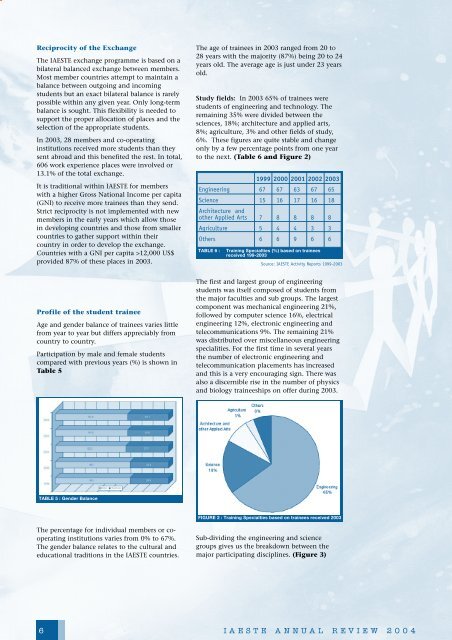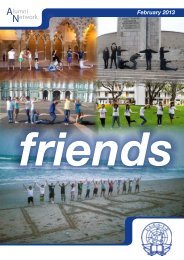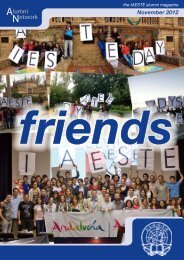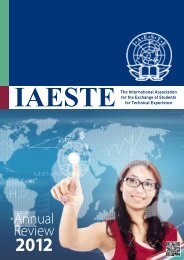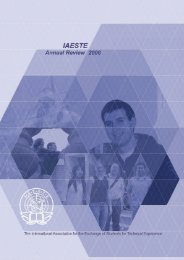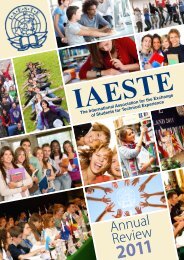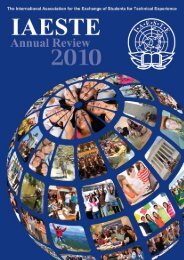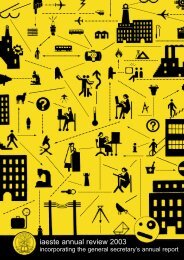IAESTE Review Cover 01
IAESTE Review Cover 01
IAESTE Review Cover 01
Create successful ePaper yourself
Turn your PDF publications into a flip-book with our unique Google optimized e-Paper software.
Reciprocity of the Exchange<br />
The <strong>IAESTE</strong> exchange programme is based on a<br />
bilateral balanced exchange between members.<br />
Most member countries attempt to maintain a<br />
balance between outgoing and incoming<br />
students but an exact bilateral balance is rarely<br />
possible within any given year. Only long-term<br />
balance is sought. This flexibility is needed to<br />
support the proper allocation of places and the<br />
selection of the appropriate students.<br />
In 2003, 28 members and co-operating<br />
institutions received more students than they<br />
sent abroad and this benefited the rest. In total,<br />
606 work experience places were involved or<br />
13.1% of the total exchange.<br />
It is traditional within <strong>IAESTE</strong> for members<br />
with a higher Gross National Income per capita<br />
(GNI) to receive more trainees than they send.<br />
Strict reciprocity is not implemented with new<br />
members in the early years which allow those<br />
in developing countries and those from smaller<br />
countries to gather support within their<br />
country in order to develop the exchange.<br />
Countries with a GNI per capita >12,000 US$<br />
provided 87% of these places in 2003.<br />
Profile of the student trainee<br />
Age and gender balance of trainees varies little<br />
from year to year but differs appreciably from<br />
country to country.<br />
Participation by male and female students<br />
compared with previous years (%) is shown in<br />
Table 5<br />
TABLE 5 : Gender Balance<br />
The percentage for individual members or cooperating<br />
institutions varies from 0% to 67%.<br />
The gender balance relates to the cultural and<br />
educational traditions in the <strong>IAESTE</strong> countries.<br />
The age of trainees in 2003 ranged from 20 to<br />
28 years with the majority (87%) being 20 to 24<br />
years old. The average age is just under 23 years<br />
old.<br />
Study fields: In 2003 65% of trainees were<br />
students of engineering and technology. The<br />
remaining 35% were divided between the<br />
sciences, 18%; architecture and applied arts,<br />
8%; agriculture, 3% and other fields of study,<br />
6%. These figures are quite stable and change<br />
only by a few percentage points from one year<br />
to the next. (Table 6 and Figure 2)<br />
1999 2000 20<strong>01</strong> 2002 2003<br />
Engineering 67 67 63 67 65<br />
Science<br />
Architecture and<br />
15 16 17 16 18<br />
other Applied Arts 7 8 8 8 8<br />
Agriculture 5 4 4 3 3<br />
Others 6 6 9 6 6<br />
TABLE 6 : Training Specialties (%) based on trainees<br />
received 199-2003<br />
Source: <strong>IAESTE</strong> Activity Reports 1999-2003<br />
The first and largest group of engineering<br />
students was itself composed of students from<br />
the major faculties and sub groups. The largest<br />
component was mechanical engineering 21%,<br />
followed by computer science 16%, electrical<br />
engineering 12%, electronic engineering and<br />
telecommunications 9%. The remaining 21%<br />
was distributed over miscellaneous engineering<br />
specialities. For the first time in several years<br />
the number of electronic engineering and<br />
telecommunication placements has increased<br />
and this is a very encouraging sign. There was<br />
also a discernible rise in the number of physics<br />
and biology traineeships on offer during 2003.<br />
FIGURE 2 : Training Specialties based on trainees received 2003<br />
Sub-dividing the engineering and science<br />
groups gives us the breakdown between the<br />
major participating disciplines. (Figure 3)<br />
6 I A E S T E A N N U A L R E V I E W 2 0 0 4


